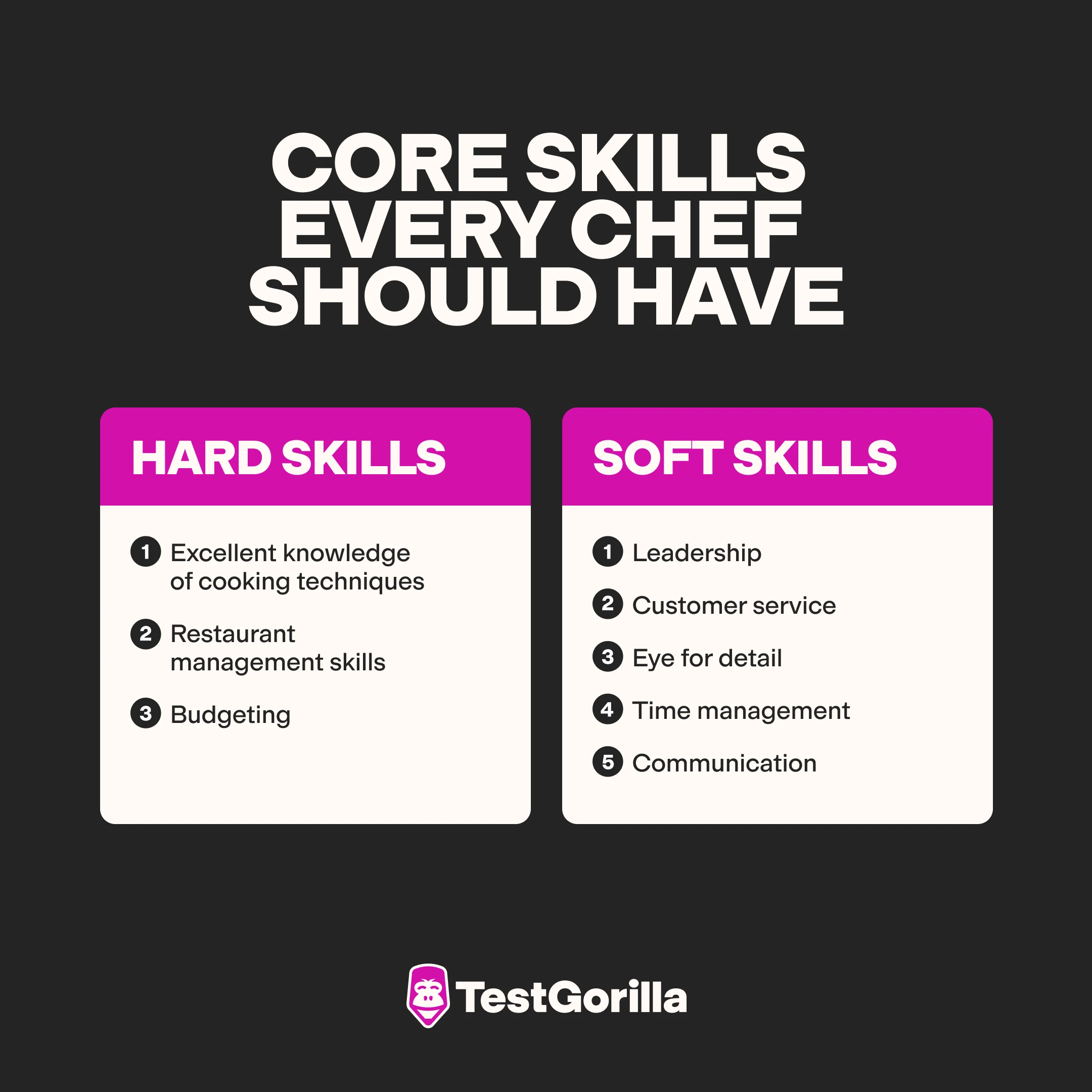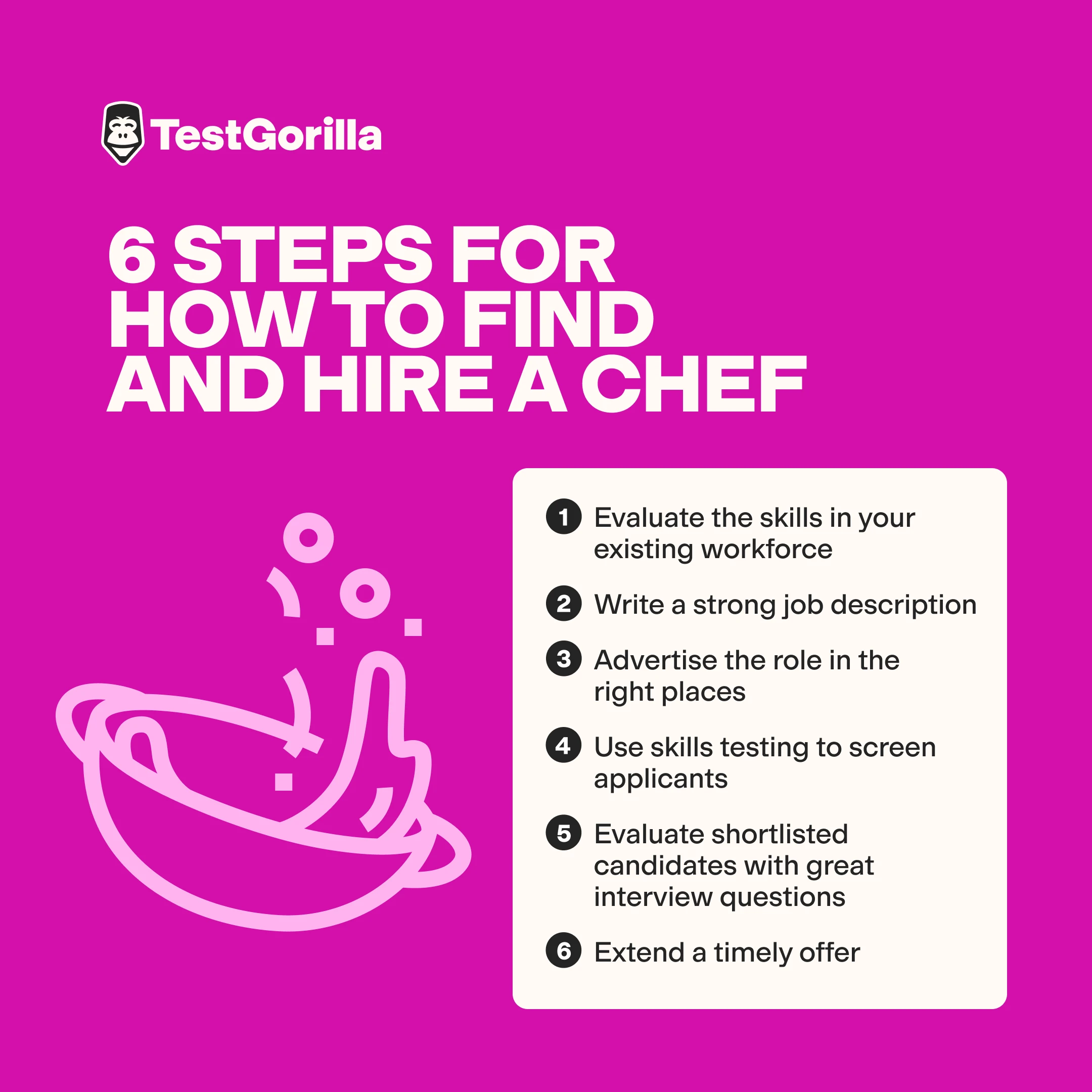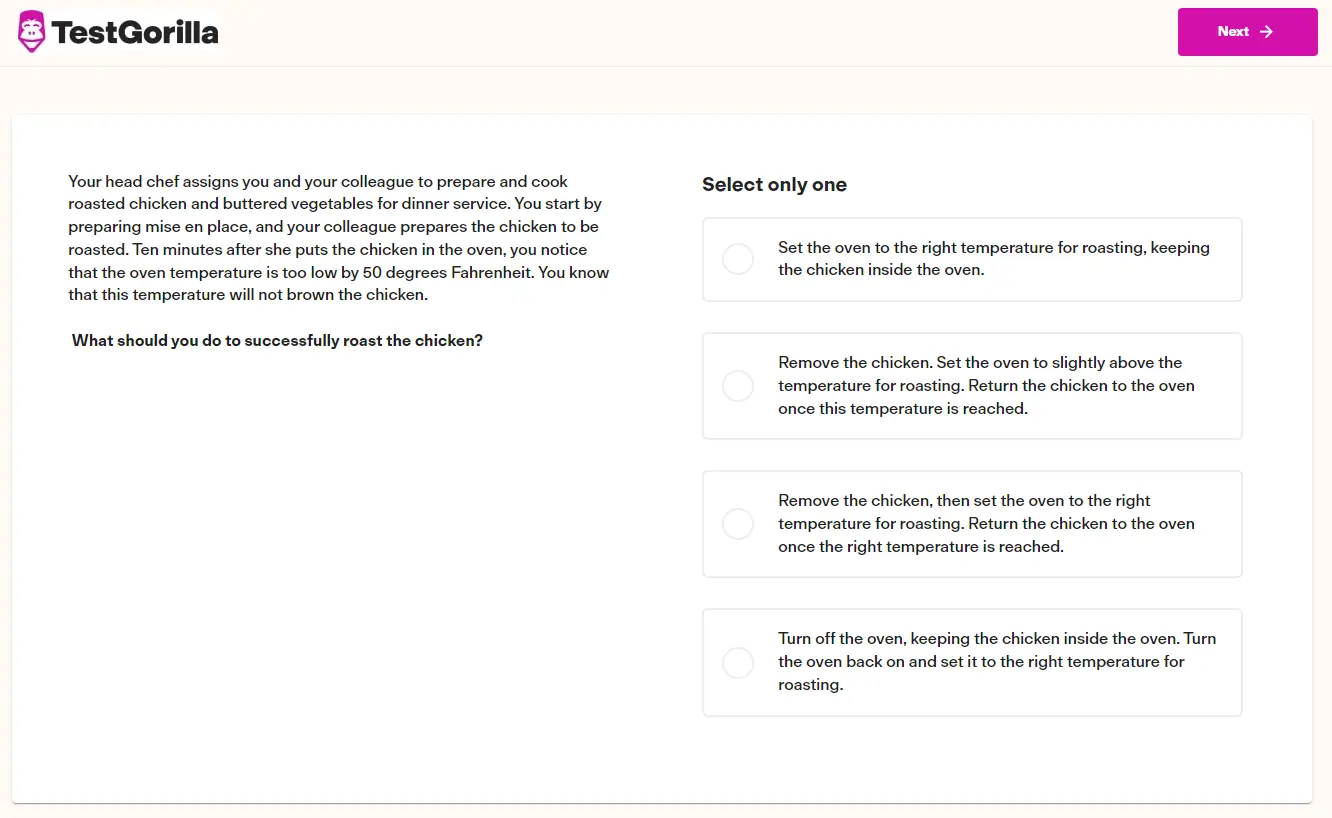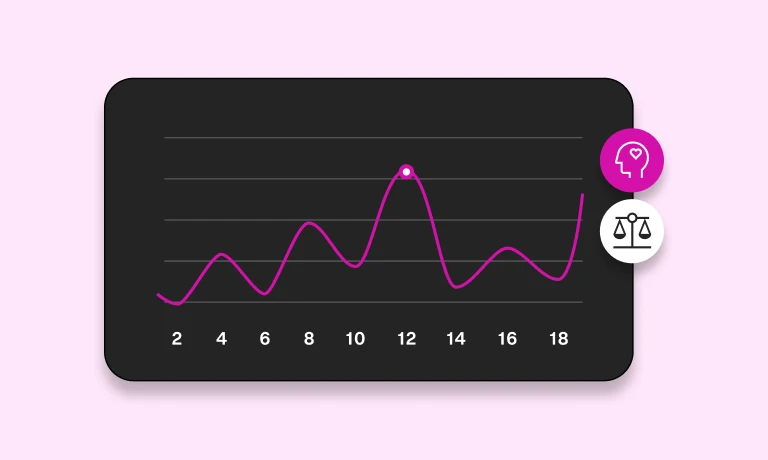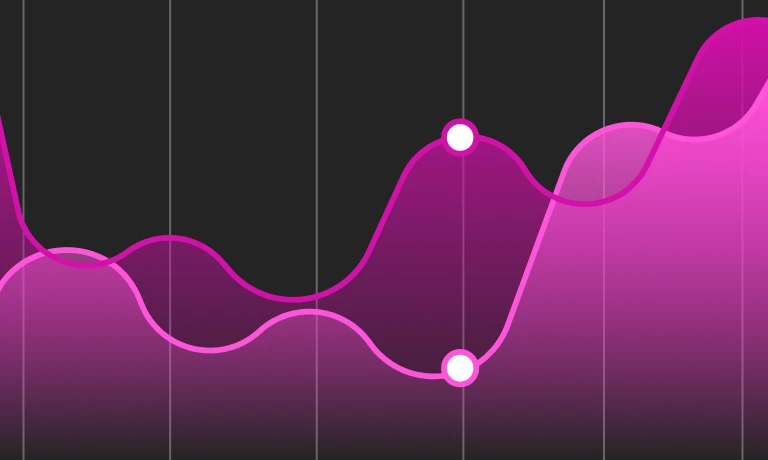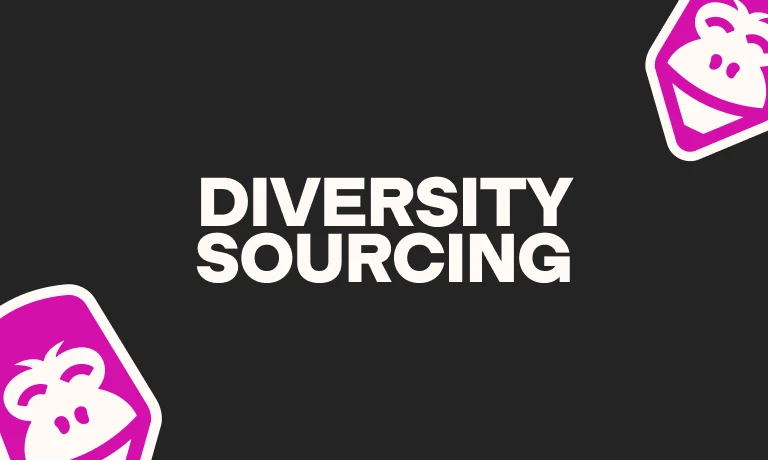Find a chef with the skills you need, fast.
Behind every chef job opening, a stressed-out restaurant manager is trying to fill the gap and salvage their customers’ dining experience.
Knowing how to hire a chef with the relevant skills and the right fit for your team is no mean feat, and it’s even harder to do in a time crunch.
We’re here to help you out.
In this article, we cover the recipe for success when hiring a chef. We include a step-by-step guide to hiring chefs, how skills testing can help speed up the process, and frequently asked questions.
What is a chef?
A chef is the person who conceptualizes and creates your restaurant’s menu from scratch. Chefs often specialize in a particular cuisine – for instance, Italian or French cuisine – and run the kitchen to ensure food is prepared expertly and reaches diners on time.
A chef’s main duties are to:
Plan menus
Handle inventory
Create new recipes
Take care of quality control
Improve plate presentation
Coach and hire restaurant staff
Ensure safety standards and cleaning practices are followed in the kitchen
The head chef or executive chef is in charge of the menu and running the kitchen, but many of the tips below also help you understand how to hire for less senior chef positions, including:
Chef de cuisine
Sous chef
Chef de partie
Commis chef
What is the difference between hiring a chef and a cook?
There are important differences between a chef and a cook.
When learning how to find a chef for a restaurant, you need to be aware of the different hospitality skills required for each role. Here’s a summary:
| Chefs | Cooks |
Tasks | - Head chefs create recipes from scratch and build the menu - Less senior chefs, like chefs de cuisine, prepare specialty dishes that require more narrow expertise and help develop new recipes | - Have a mastery of cooking techniques - Follow the chef’s recipes and dietary recommendations to execute the menu |
Responsibilities | - Take responsibility for the reputation of the restaurant and run the back of the house - Oversee and manage the kitchen crew - Can jump into any position and guide their coworkers | - Focus on their workstation – for example, the grill - Don’t have management duties |
Experience and training | - Usually need at least five years of experience – often as cooks - Many top chefs have formal training at culinary schools | - No formal experience is required to start with, though cooks usually work their way up the kitchen by learning on the job |
How to hire a private chef vs. hiring a chef for a restaurant
Hiring a chef for a restaurant is significantly different from knowing how to hire a private chef for at-home personal chef service.
A restaurant chef works as part of a team, designing dishes to make a profit for the restaurateurs. By contrast, private chefs are much less common. They generally work solo, in private residences, or for private functions like dinner parties, creating dishes and menus according to the client’s specifications.
A personal chef who works primarily on their own may, therefore, have less of a need for business skills like leadership and management.
Even though this article primarily focuses on hiring a chef for a restaurant, many of the points here are transferable when learning how to hire a private chef.
Why hire a chef?
Hiring an experienced chef is important to get right because your chef is one of the most important figures in your restaurant. It is their job to:
1. Design amazing menus
Your food is your selling point, and a good chef can create a crowd-pleasing menu to attract customers. They can also design a combination of sustainable dishes for your kitchen to produce night after night.
2. Cook delicious food
Chefs don’t just talk the talk; they rock the wok (or sauté pan, or grill – you get the
idea). They cook the food well themselves and ensure that others’ cooking is up to standard, too.
3. Manage service
A full-time executive chef oversees the whole kitchen to ensure that dishes come together promptly, maintaining your reputation for good service and preventing bad reviews.
4. Train your employees
Chefs teach the sous chefs and cooks on their team how to prepare the dishes on the menu, but they may also impart additional wisdom about cooking techniques or managing a kitchen.
5. Build your brand
Chefs take on a lot of responsibility for the reputation of your restaurant. If they do a good job, it can boost your profile and secure your place at the top of people’s “must-try” lists.
The best insights on HR and recruitment, delivered to your inbox.
Biweekly updates. No spam. Unsubscribe any time.
8 fundamental skills needed for a chef
To understand how to hire a chef for your restaurant who can deliver all the benefits discussed above, you need to know what skills to look for.
Here are eight skills to look for when hiring a chef.
Chef hard skills
Let’s start with the hard skills you should look for when hiring chefs. These are the technical, often role-specific skills every chef should have.
Chef hard skills | Summary |
Excellent knowledge of cooking techniques | - This one’s obvious. A chef must know how to cook. No matter what cuisine a chef specializes in, they must thoroughly understand the basic cooking techniques. - Knowledge of different cooking styles, such as pastry baking, is an advantage. It’s also fairly common because many executive chefs start as chefs in other stations. |
Restaurant management skills | Chefs don’t just work on your menu. They also serve a managerial function for the rest of your team. Someone with strong restaurant management skills: - Manages inventory - Generates accurate reports - Ensures your restaurant meets health and safety regulations - Oversees all cooking operations and controls food quality |
Budgetin | Your chef develops recipes for your menu and handles the inventory, so they play a big part in maintaining your budget and can: - Plan costs effectively - Regulate spending - Make good financial decisions - Improve the restaurant’s financial wellbeing |
Chef soft skills
Next, let’s discuss the interpersonal skills to look for when hiring chefs.
Chef soft skills | Summary |
Leadership | Chefs are the leaders of the kitchen. They must be able to: - Tutor the staff - Delegate tasks effectively - Monitor the junior kitchen staff closely - Step in to give directions when necessary - Remain motivated despite any obstacles - Inspire the kitchen personnel to learn and achieve better results |
Customer service | A chef with good customer service skills is attentive to the guests’ needs, addresses any concerns or conflicts effectively, remembers and appreciates regular customers, and increases the guests’ satisfaction with your establishment. |
Eye for detail | Chefs who pay close attention to details can: - Create fascinating recipes - Read and order inventory correctly - Manage the kitchen staff attentively - Apply various cooking techniques impeccably |
Time management | The person in charge of the cooking process must have excellent time management skills to provide high-quality dishes on time, optimize cooking times and food preparation, and prioritize tasks while taking into consideration multiple factors. |
Communication | We all know tempers run high in the kitchen, particularly in high-pressure roles like chefs. We’re not here to tell you to look for even-tempered chefs; instead, look for chefs whose tempers don’t get in the way of their ability to communicate with their team. A chef who can express themselves clearly and concisely under pressure: - Increases customer satisfaction - Encourages effective collaboration - Boosts employee morale and engagement - Ensures a smooth working process and keeps the kitchen together |
6 steps for how to find and hire a chef
Hiring a chef doesn’t have to be difficult.
Here’s a simple step-by-step guide to how to hire a chef for your restaurant.
1. Evaluate the skills in your existing workforce
First, it’s worth taking a closer look at the skills you already have in your catering team.
There may be some glaring gaps, such as the culinary experience needed to design a menu or a specific area of cooking expertise. However, there could also be less obvious things you’re missing.
For instance, you may not realize your team lacks time management skills or budgeting know-how. That’s where a skills gap analysis comes in handy.
A skills gap analysis is when you test your current team using skills assessments to see if there are any important skills you’re missing. You can then prioritize these when searching for and shortlisting candidates.
A skills gap analysis is also a good opportunity to administer personality tests, which can help you understand more about the types of personalities your new chef would manage in their new role.
You could then use this information to evaluate how candidates’ personalities mesh in this team.
2. Write a strong job description
Now that you know which skills you want to prioritize, it’s time to write your head chef job description and prepare the job postings.
The job description should always include:
Salary
Responsibilities
Who they report to
Benefits
A chef job description template for speeding things up
[YOUR COMPANY’S NAME] is looking for a creative and skilled professional chef to create delicious meals and an innovative menu for our guests.
As our chef, you must plan and develop our menu and guide and collaborate with our kitchen team to ensure all cooking processes are running smoothly.
Chef job responsibilities:
Use a variety of ingredients and flavors to develop new fine-dining recipes
Plan a nutritious and delicious menu
Make ingredient and inventory purchasing decisions in accordance with the budget
Supervise and mentor the kitchen’s staff
Oversee the cooking operations and step in when necessary
Make sure that all health and safety procedures are being followed strictly
Receive feedback and apply changes to the cooking process when necessary
Manage inventory
Ensure that all food is well prepared, presented in a pleasing manner, and served on time
Place orders to resupply insufficient ingredients
Chef job requirements:
Advanced knowledge of the culinary arts
Strong leadership qualities
Knowledge of sanitary and safety procedures
Attentive and motivated
Expert at multitasking and time management
Portfolio of unique dishes
A passion for cooking
A culinary school diploma
3-5 years of chef experience (or equivalent)
3. Advertise the role in the right places
Next, you need to advertise the role in the right places, including general job boards such as LinkedIn or Indeed and social media, but you should also look further afield.
Also, post the position on industry-specific websites, for example:
iHireChefs: This platform offers a handpicked selection of culinary professionals for hire.
hCareers: hCareers specializes in hospitality job opportunities and has a revolutionized job matching system.
Finally, don’t neglect to make use of your existing network. Your existing kitchen staff may have worked with one or two talented chefs in their past kitchens. Tap into their networks to find referrals or spread the word about the role.
4. Use skills testing to screen applicants
Talent assessments, which evaluate your applicants’ relevant skills, are often used for office-based roles, so you might think they’re less relevant to hands-on positions like a chef – after all, you can’t taste someone’s cooking through a screen.
However, you can test many essential skills needed for a chef to run a kitchen using TestGorilla’s assessments.
Build a skills assessment of up to five tests from TestGorilla to find your most qualified candidate. For example:
Cooking Techniques test: Evaluate a candidate’s abilities to use essential cooking techniques effectively. It’s suited for every level of chef in the kitchen hierarchy and helps you hire the right chef.
Budgeting test: Identify applicants who can create recipes while monitoring and controlling your budget.
Restaurant Management test: Gauge your candidates’ skills for successfully managing a restaurant.
Leadership test: Determine a chef’s ability to lead others while using influence and guidance.
Customer Service test: Find out whether your candidates can properly respond to customer issues and improve customer satisfaction.
Find out how to supercharge candidate screening with TestGorilla.
Skills testing could cut your screening process down significantly – find out how from an expert.
5. Evaluate shortlisted candidates with great interview questions
With core skills verified using skills testing, you can then use the interview process to dig deeper into candidates’ skills.
The first step is to taste their dishes. No need to go for complex meals. What tests a chef’s abilities is being able to do the basics flawlessly. Frequently, the ultimate test of a chef’s cooking skills is how well they can prepare something as simple as an omelet.
Secondly, you must ensure you’re asking the right interview questions. These include questions like:
What motivates you to work on and improve your cooking techniques?
Why did you choose to pursue a career as a chef?
Why have you applied for our chef role?
What are your strongest skills as a chef?
In the early stages, consider using a structured interview process – asking all candidates the same questions in the same order – to ensure you evaluate each candidate fairly.
In the final interview, you must customize your questions to learn more about your candidates' strengths and weaknesses.
Use the results from the skills assessment you administered earlier during the chef hiring process to create personalized questions for all of the approved candidates.
6. Extend a timely offer
Talent moves fast in the hospitality sector: The average annual turnover rate in the restaurant industry is nearly 80%.
If you don’t make a decision quickly, you could risk losing top talent, so it’s important to use fast screening tools like skills testing to verify chefs’ skills and make a hiring decision fast.
McGillicuddy Hospitality is one example of a company that is doing this effectively. These hospitality operations consultants screen candidates faster since switching to skills-based hiring, and the company estimates that it saves around $2,100 in hiring costs per position.
Include a clear salary offer and outline the available benefits in any offer you send.
Find the skills you need for a chef fast.
You can get started with TestGorilla for free today. Simply sign up and create your first test bundle to start screening chefs today.
How much does it cost to hire a chef?
So, how much is it to hire a chef? The first costs come from the hiring process: paying for your job ad to be shown on relevant job boards and paying your staff to screen and interview candidates.
The average recruitment cost in the US is estimated to be nearly $5,000, but this may differ depending on your location, network, and requirements.
In addition to hiring costs, there’s also the chef’s salary to consider.
According to salary.com, the average salary for a chef in the US is $50,454, ranging from $45,117 to $61,512. High-quality chefs are in high demand, so make sure to offer a competitive salary and list the following:
Paid vacation time
Benefits and bonuses
Advancement opportunities
Health insurance and retirement plans
How to hire a chef the right way: Use TestGorilla’s skills tests
In this article, we’ve covered:
Why hiring a chef is important for your restaurant
The skills to look for when hiring chefs
How to find a chef with the skills you need
How much does it cost to hire a chef
You’ve got the ingredients for a great hire – now it’s time to get cooking.
To get an expert view of how skills-based hiring could work for your business, sign up for a 40-minute demo with TestGorilla today.
Or, if you’re ready to start, try five free tests out by signing up for our Free forever plan.
How to hire a chef FAQs
Still wondering where to find a chef for my restaurant? Here are some common queries about hiring chefs.
How do I hire a great chef?
Evaluate the skills in your existing workforce to spot any gaps
Write a strong job description
Advertise the role on industry-relevant websites
Use skills testing to screen applicants quickly and effectively
Evaluate shortlisted candidates in structured interviews
Extend a timely offer
What skills should I test to hire a chef?
Excellent knowledge of cooking techniques, for instance, frying and combination cooking
Restaurant management skills, including knowledge of food and safety standards and financial management
Budgeting
Leadership and people management
Customer service, such as dealing with customer complaints
Eye for detail
Time management
Communication
How do you interview a chef?
Prescreen candidates using skills testing to ensure you only spend time with skilled chefs
Use a structured interview approach, asking all candidates the same questions in the same order
Focus the questions on the core skills for the role
Include a practical test of their skills, for example, making a simple dish
How do I select between two qualified chefs to hire?
Consult their skills test results to see who scores best overall for key skills
Compare their skills test results with a skills gap analysis of your current team to see how to hire a chef with skills that you don’t have elsewhere
Ask each of them to make a dish that they would put on your menu and taste test
Invite them to complete a paid job trial to see how they mesh with your current team
What are the ranks of chefs?
Head chef or executive chef, who sets the menu and runs the kitchen. In larger restaurant operations, their role is mainly managerial.
Chef de cuisine. In large kitchens, they report to the executive chef and run the kitchen according to their instructions, including cooking.
Sous chef, the second-in-command to the head chef.
Chef de partie, who is responsible for food preparation.
Commis chef, who works under the chef de partie to perform support duties such as cooking and cleaning.
You've scrolled this far
Why not try TestGorilla for free, and see what happens when you put skills first.



